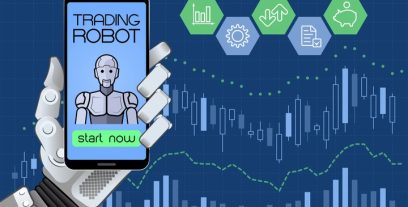
 WhatsApp: +98-9171792581
WhatsApp: +98-9171792581  Telegram ID: @aayateam
Telegram ID: @aayateam
🤖 Types of Forex Robots and How to Use Them
🚀 Are you looking for a way to automate your trading in the Forex market?
📉 Forex robots offer different solutions depending on your trading style and strategy! 🔥
✅ In this article, we will explore:
✔️ What are the types of Forex robots? 🤖
✔️ How does each type of trading robot work? ⚙️
✔️ How to properly use a Forex robot 🛠️
✔️ The advantages and disadvantages of each type of robot 📊
🔹 1️⃣ What are the types of Forex robots? 🤖
📌 Forex robots come in different forms, each designed for a specific strategy.
✅ They can be classified into:
1️⃣ Technical Analysis Robots 📊
2️⃣ News (Fundamental Analysis) Robots 📰
3️⃣ Scalping Robots ⚡
4️⃣ Grid Trading Robots 🕸️
5️⃣ Hedging Robots 🔄
6️⃣ Artificial Intelligence and Machine Learning Robots 🤖
📢 💡 Each type operates differently and should be chosen based on your individual trading style!
🔹 2️⃣ Technical Analysis Robots 📊
✅ These rely on technical indicators to generate trade signals.
✅ They open and close trades based on price movements and chart patterns.
📌 How do they work?
✔️ They use indicators like RSI, MACD, and Moving Averages.
✔️ They determine entry and exit points based on support, resistance, and trends.
✔️ They do not rely on news or economic events.
📢 🎯 Ideal for traders who base their decisions solely on technical analysis!
🔹 3️⃣ News Robots (Fundamental Analysis) 📰
✅ Focus on economic news and reports such as NFP, interest rates, and central bank decisions.
✅ They open trades before or after news releases based on expectations.
📌 How do they work?
✔️ They connect to financial news sources and analyze the impact on currency pairs.
✔️ They place buy or sell orders based on news outcomes.
✔️ Very fast but risky due to high volatility.
📢 💡 Suitable for traders wanting to capitalize on strong market moves driven by economic news!
🔹 4️⃣ Scalping Robots ⚡
✅ Execute dozens or hundreds of trades daily with small but frequent profits.
✅ Require very fast execution and low latency.
📌 How do they work?
✔️ Exploit small price differences between bid and ask.
✔️ Use strategies on very short timeframes (M1, M5).
✔️ Need low spread environments and high execution speed.
📢 ⚠️ Not suitable for small accounts because they require significant capital to cover commissions and spreads!
🔹 5️⃣ Grid Trading Robots 🕸️
✅ Open buy and sell orders at fixed price intervals regardless of market direction.
✅ Can be profitable in sideways markets but risky in volatile trends.
📌 How do they work?
✔️ Place buy and sell orders at fixed gaps (e.g., every 20 pips).
✔️ Orders get triggered gradually as price moves, capturing profits from fluctuations.
✔️ Work best in ranging markets but can cause big losses in trending markets.
📢 ⚠️ Require strong money management to avoid margin calls from large swings!
🔹 6️⃣ Hedging Robots 🔄
✅ Open opposite trades simultaneously to protect capital and reduce risk.
✅ Used when strong but uncertain market moves are expected.
📌 How do they work?
✔️ If the robot opens a buy trade, it simultaneously opens a sell trade on the same pair to limit potential losses.
✔️ When the trend becomes clear, it closes the losing position and keeps the winning one.
✔️ Suitable for traders who want to minimize risk in volatile markets.
📢 💡 Useful for loss protection but can limit potential profits!
🔹 7️⃣ Artificial Intelligence and Machine Learning Robots 🤖
✅ Use AI to analyze market data and learn from past performance.
✅ Can adapt better to market changes than traditional robots.
📌 How do they work?
✔️ Analyze large historical datasets to detect market patterns and forecast trends.
✔️ Learn from successes and mistakes to improve over time.
✔️ Require strong computing resources for backtesting and optimization.
📢 ⚠️ More advanced than conventional robots but require expertise to fine-tune settings!
🔹 8️⃣ How to Use a Forex Robot Correctly 🛠️
✅ 1. Choose the Right Robot 🎯
✔️ Select based on your strategy and trading style.
✔️ Ensure the robot supports your traded assets.
✅ 2. Test the Robot on a Demo Account 🧪
✔️ Run it on a demo for several months.
✔️ Use backtesting to evaluate performance on historical data.
✅ 3. Monitor Performance Regularly 👀
✔️ Don’t rely 100% on it; watch daily results.
✔️ Confirm market conditions haven’t changed in ways that hurt the strategy.
✅ 4. Adjust Risk Settings 🚨
✔️ Avoid using excessively high leverage.
✔️ Set risk per trade according to your capital size.
✅ 5. Keep the Robot Updated 🔄
✔️ Update regularly to maintain efficiency with market changes.
✔️ Continuously tweak settings based on performance analysis.
🔹 9️⃣ Conclusion 📝
✅ Forex robots come in various types, each with its own strategy!
✅ Some depend on technical analysis, others on news, and some utilize AI.
✅ Testing the robot before live use and adjusting settings carefully is essential.
✅ Never rely solely on the robot—always monitor its performance to manage risks.
📢 💬 Have you tried any Forex robot types before? 🤔 Share your experience in the comments below! 👇🔥






Comments (0)